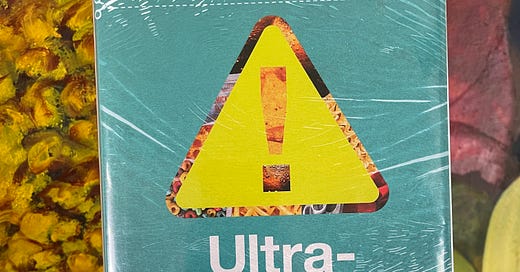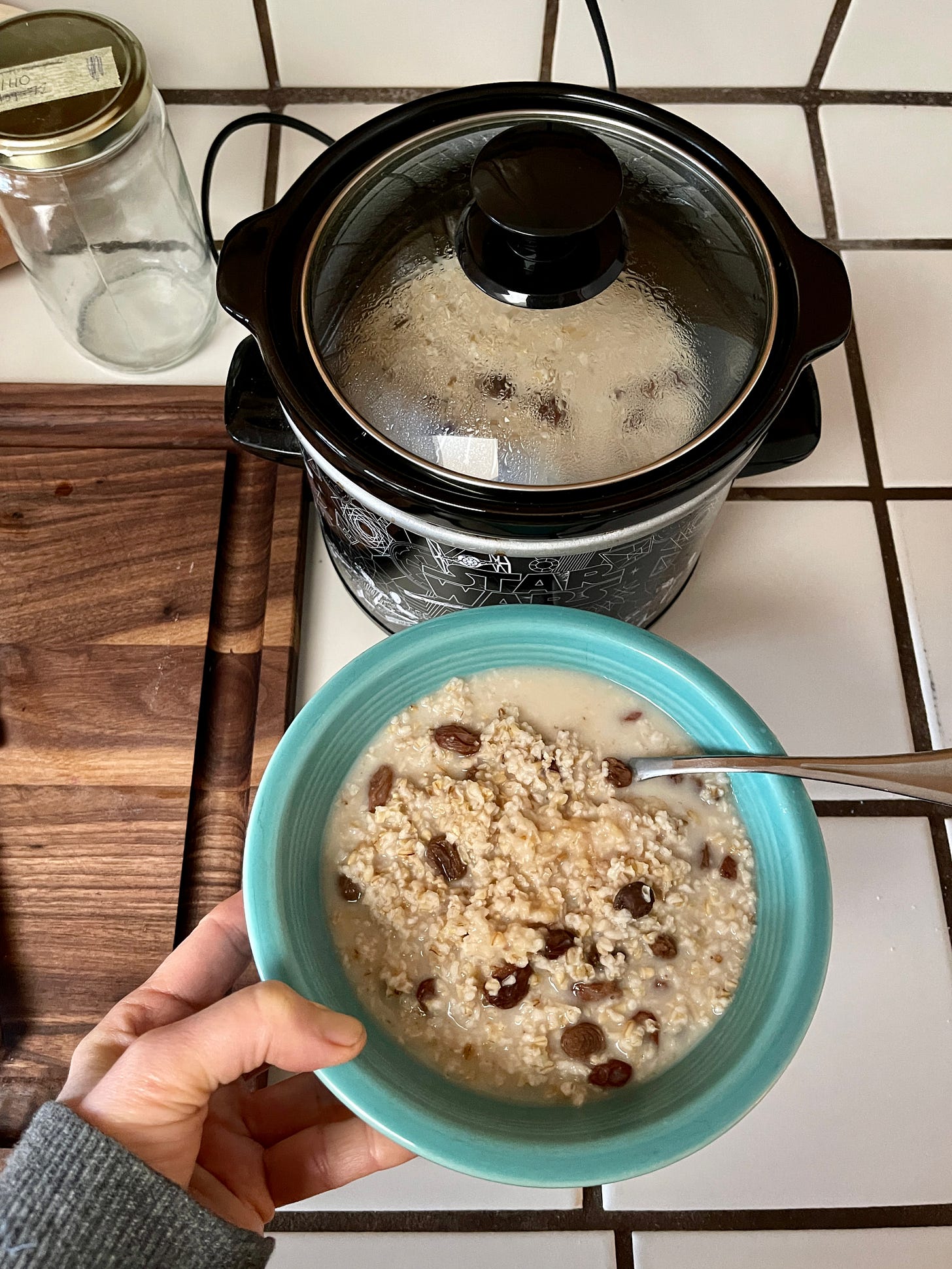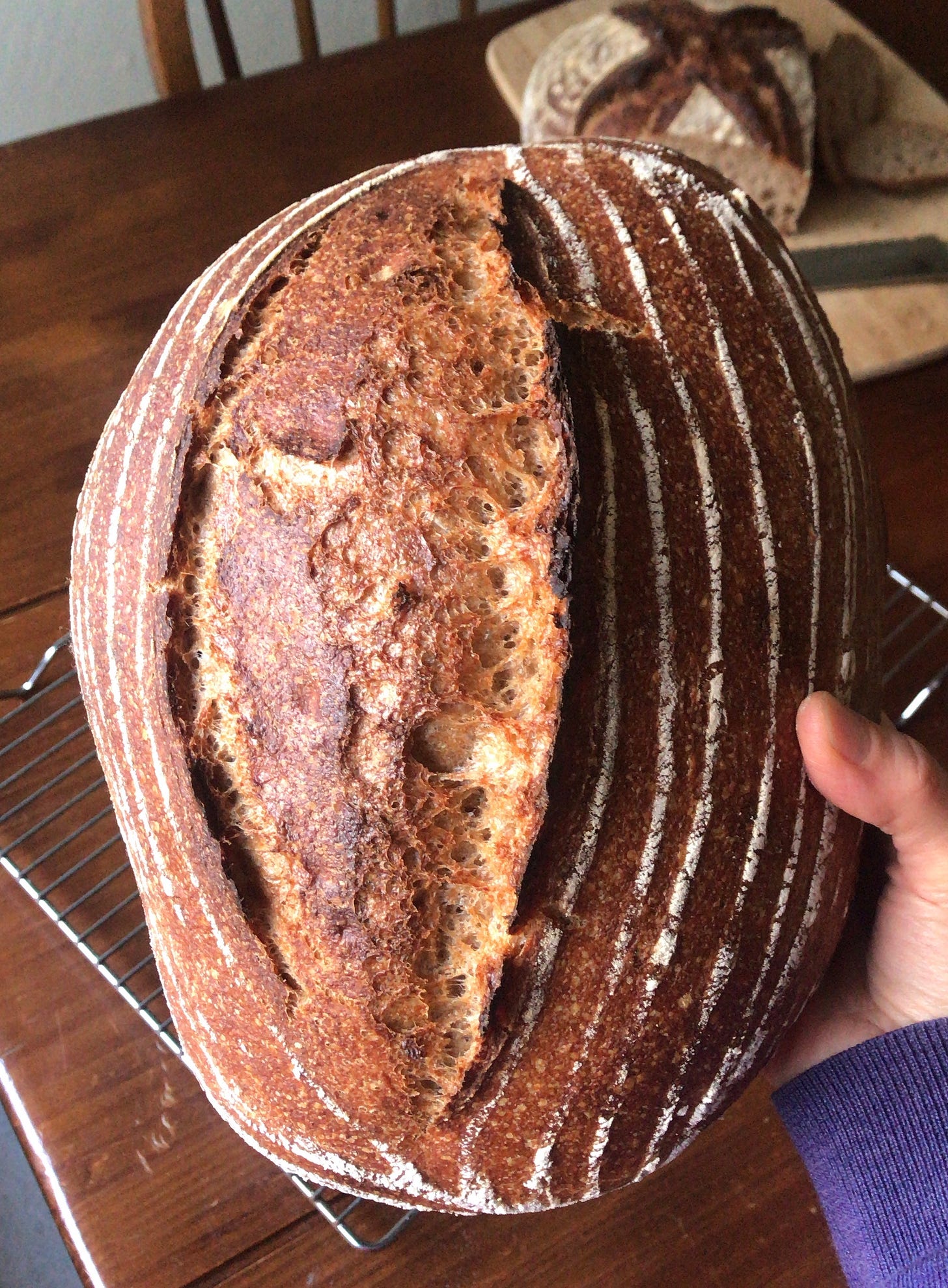What to Cook After Reading Ultra-Processed People
If you've read the book, you may wonder "What am I going to eat?"
Everyone who eats will want to read Ultra-Processed People by Chris van Tulleken, a scientist, doctor and award-winning BBC broadcaster. Van Tulleken explores the science and health impacts of ultra-processed foods (UPFs), which make up as much as 60 percent of diets in the UK and the US. And he does so in a non-judgmental way. As the book description states, “It’s not you, it’s the food.” That “food” consists of substances that, until recently, we've never consumed in all of human history, manufactured by huge conglomerates that profit wildly from pushing food that isn’t food.
Although my family has not yet read the book, it reminds them of Michael Pollan’s The Omnivore’s Dilemma because as I read Ultra-Processed People, a few times a day, I would text them passages or call them to read them passages. After many days of this, I would see “read” beneath my unanswered text messages or hear the uh-huhs over the phone. While my family didn’t sign up to hear about my latest favorite book on food science and food politics, you all sort of did by registering for this newsletter.
But first, what is ultra-processed food (UPF)?
Van Tulleken writes "UPF has a long, formal scientific definition, but it can be boiled down to this: if it's wrapped in plastic and has at least one ingredient that you wouldn't usually find in a standard home kitchen, it's UPF. Much of it will be familiar to you as 'junk food', but there's plenty of organic, free-range, 'ethical' UPF too, which might be sold as healthy, nutritious, environmentally friendly or useful for weigh loss (it's another rule of thumb that almost every food that comes with a health claim on the packet is a UPF)."
Far too many people must rely on cheap, convenient UPFs. And corporations in turn rely on their workers eating these convenient products. Van Tulleken explains: "Here is the inexorable logic of all industrial food: to reduce the time workers require for a meal."
What do UPFs do to us and the planet?
Read the book for the full horrors of ultra-processed food. Some takeaways:
Chemical and physical processing render food so soft that we eat it quickly, do not register as full and continue to eat. Because soft food requires little chewing, UPFs may also have shrunk the size of our underused jaws (!).
UPFs are designed to drive overconsumption.
Emulsifiers, ubiquitous in UPFs, can mess up our gut health.
UPFs displace whole foods from our diets. (Our stomachs can hold only so much.) Similarly, the proliferation of UPFs around the world has upended traditional diets.
The intensive industrial farming necessary to produce UPFs destroys the environment.
No one is coming to save us
Until governments regulate ultra-processed food like other harmful substances such as tobacco, no giant food corporation will change voluntarily. I imagine many employees, even at a company as notorious as Nestlé, worry about what they have unleashed upon the public but one company cannot go it alone and start selling options that won’t, well, sell. If Coke stopped loading its soda with sugar, Pepsi would gain a huge advantage. Only until Coke and Pepsi and all other sugar-water purveyors are forced to slap warning labels on their sodas, or be subject to soda taxes, or banned from K-12 schools, or regulated in some other way, will change come about.
Corporations exist to create shareholder value. They will not produce healthier products if that reduces their bottom line.
7 (mostly) easy ways to eat more whole foods
When I broke up with plastic in 2011, I also inadvertently broke up with ultra-processed food—it’s almost always wrapped in plastic—and started cooking more staples. That doesn’t mean I spend every waking moment in the kitchen. Rather, I cook simple—yet delicious—food.
I imagine if you read this newsletter, you may not eat a lot of UPFs. Still, you may eat more than you want to. And if you read van Tulleken’s book, you likely won’t want to eat any. The following ideas for eating more whole foods assume you have access to them. Many people do not and the book explores that injustice at length.
1. Leave the ultra-processed snacks on the store shelves
This might be the easiest step depending on how difficult you find it to forgo those snacks. But if you don’t have boxes of crackers in the cupboard, you will more likely eat the apples in the fruit bowl. And while you may not be able to stop eating a box of Triscuits, a pile of apples simply won’t tempt you in the same way.
By eating fewer UPFs and more whole foods, you’ll likely buy less food packaged in plastic, which can leach toxins into the food. The book touches upon the hazards of plastic food packaging and plastic pollution.
2. Buy fruit, not juice
Fruit stripped of its fiber makes juice, which contains as much sugar as a Coke. Van Tulleken refers to a 1977 study in which subjects consumed fibre-free apple juice, apple purée or whole apples. Insulin levels spiked in the subjects who consumed the apple juice or apple purée and fell to lower levels than they had been initially, leaving those subjects hungry.
“Apple juice, which is typically around 15 percent sugar, behaves much like any soft drink. But so does the apple purée, even though it contains all the constituents of the apple, including the fibre, and was made moments before consumption. Fiber is important, but the matrix, the structure of the apple, is key.”
3. Double or triple a one-pot dish
Make a vat of lentil soup, baked beans, Bolognese (okay two pots because you’ll have to cook pasta) and freeze some to enjoy later. You’ll cook less and have food on hand when you feel too tired to cook dinner.
4. Set aside a few hours on your day off to cook
A few hours of prep will make your life much easier and you’ll likely eat better. After I return home from food shopping on the weekend, I’ll spend the afternoon cooking. I might cook beans in my pressure cooker, simmer a large pot of broth and cook a vat of soup (potato-leek this week). I also might clean gritty beet greens or spinach or mix together the topping for a fruit crumble, which keeps for several days. (Van Tulleken writes that the presence of bag of sugar in a home usually indicates that cooking takes place, which signifies healthier eating.) I’ll listen to NPR and learn something as well. Later in the week, I’ll quickly assemble prepped items into delicious meals.
5. Cook a pot of oatmeal
Most weeks, I cook a pot of steel-cut oats, enough for a few servings. Steel-cut oats reheat well and taste delicious topped with a bit of nut butter, seeds (chia, sunflower and pumpkin, for example), chopped apple or raisins and a bit of maple syrup and kefir. Not only do the steel-cut oats keep me fuller longer than Cheerios would, they cost less.
6. Make sauerkraut
Easy-to-prep sauerkraut, made with mere cabbage and salt (and if desired, other vegetables and spices) contains live cultures that benefit our guts and costs a fraction of probiotic supplements that may not actually work to fix the gut issues exacerbated by UPFs. (Some of the food companies that sell the products that make us sick now also market the cures.) Preparing sauerkraut requires a few minutes of hands-on chopping and crushing but after fermentation, keeps for months. Go here for basic sauerkraut instructions.
7. Bake sourdough bread
Okay, so not everyone has the time or desire to bake bread. If you don’t want to bake it, find a bakery that carries true sourdough. It contains flour, water and salt. The sourdough starter, or wild yeast, that makes the bread rise, contains only flour and water.
If you would like to bake sourdough bread, you’ll first need to procure a starter. Snag a spoonful from a bakery or a baking friend or make one in my next free sourdough starter Zoom class on April 25th at 4pm PT/7pm ET. Go here to register.
By the time you read this, that workshop may have filled up but I teach it every couple of months and also have loads of sourdough information on my website here.
Finally, don’t worry about every little thing!
Worrying can make you sick. Try not to obsess over each morsel of food you consume. Avoiding UPFs is not easy and you need to eat!
Upcoming in-person events
April 5th, 6pm: Fermentation demo, Downtown Los Altos Earth Month First Friday. Find out more about this Earth Month event here.
April 6th: Induction cooking demo, Menlo Park Spring Event. Register here.
April 13th: Induction and plant-based cooking demo, Love Our Earth Festival, Palo Alto. Go here to register.
April 14th, 11am–2pm: Book Signing and Produce Bag Making, Rainbow Grocery, San Francisco: My serger and I will be at Rainbow sewing free reusable produce bags out of donated fabric and scraps.
April 20th, 11am: Induction cooking demo, Mountain View Earth and Arbor Day Festival. Go here for more info.
April 20th, 2pm: Induction cooking demo, Sunnyvale Earth Day Event/Civic Center Grand Opening. Go here for more info.
May 2nd: 2024 North Bay Zero Waste Symposium, Petaluma CA. I’m one of the keynote speakers at this annual industry event. Register here.








Fabulous article! Thank you
Really grateful that you send out an email update like this as I quit Instagram recently and miss your updates!